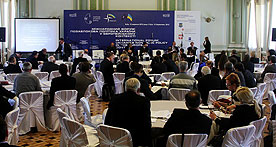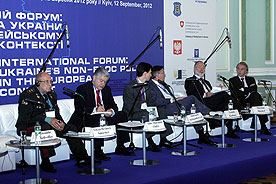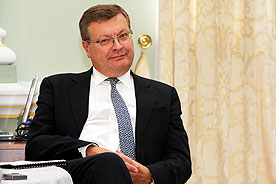High-level international forum focuses on Ukraine’s non-bloc policy
A high-level international forum about “Ukraine’s Non-Bloc Policy in the European Context” took place on 12 September at the Diplomatic Academy of Ukraine in Kyiv, organized by the Institute of World Policy and the NATO Liaison Office in Ukraine.

Discussions focused on three key questions: What has Ukraine achieved in two years of its non-bloc policy? How can Ukraine make use of European experiences in this regard? What are Ukraine’s strategic security options in the long term?
The meeting gathered current and former high-level officials and renowned experts from Ukraine, as well as from Allied and European non-aligned countries. The meeting was also attended by media and representatives of local embassies.
Ukraine’s non-bloc policy

Ukrainian Foreign Minister Kostyantyn Hryshchenko outlined the advantages of the non-bloc policy for Ukraine – both in domestic life and on the international arena. He also stressed that Ukraine continues to be an active contributor to international security efforts and presented key priorities for Ukraine’s chairmanship of the Organization for Security and Co-operation in Europe next year.
The First Deputy Secretary of Ukraine’s National Security and Defence Council, Oleksandr Medvedko, and the Deputy Chief of the General Staff of the Ukrainian Armed Forces, Lieutenant General Hryhoriy Sakovskyi, presented Ukraine’s experiences in implementing the non-bloc policy.
The ensuing discussion was supported by former foreign ministers of Ukraine and Germany, a department director from the foreign ministry, and a member of the Ukrainian parliament. Ukrainian officials argued that the non-bloc policy brought about harmony and put an end to political speculations, while also referring to the country’s enhanced cooperation with NATO. Other speakers believed the declaration of the policy was itself not enough to enhance Ukraine’s security.
The European experience

A number of representatives of non-aligned European countries presented their security policies at the forum and drew parallels with the situation in Ukraine. The State Secretary of the Finnish foreign ministry, Ambassador Pertti Torstila, a former member of the Swiss parliament, Dr Hans Widmer, the Director for Security Policy of the Austrian foreign ministry, Dr Gerhard Jandl, and the Deputy Director of the Security Policy Department of the Swedish foreign ministry, Inger Buxton, stressed that their countries were no free-riders in the security sense.
The distinguished speakers emphasized the role of international organizations in ensuring security in Europe, as well as the contributions of their respective countries to collective efforts, especially in the framework of cooperation with NATO. Experts from the Czech Republic, Hungary and Moldova, as well as the Ambassador of Estonia to Ukraine also took part in the discussion.
Ukraine’s strategic options

Ukraine’s strategic security options were outlined by Ukraine’s first Minister of Defence, Ambassador Kostyantyn Morozov, the State Secretary of the Norwegian defence ministry, Roger Ingebrigtsen, the First Deputy Minister of the Czech foreign ministry, Ambassador Jiří Schneider, and the former Polish foreign minister, Professor Adam Rotfeld. The discussion was supported by well-known experts from Ukraine, the United Kingdom and Russia, as well as by the Director of the NATO Liaison Office in Ukraine.
Speakers’ views on the most favourable security policy option for Ukraine in the long term ranged from neutrality to membership in NATO. While some argued that Ukraine should keep all of its options open, others promoted an active, rather than passive foreign and security policy stance. The discussion revealed that most experts view Ukraine’s non-bloc policy as an interim solution. At the same time, it was noted that any changes to Ukraine’s security policies were unlikely before the presidential elections in 2015.
Promoting security dialogue
The forum participants concluded that there is a need for regular focused discussion of security matters. To this end, a new platform for regular exchanges on the strategic vision of Ukraine’s national security policy – the Strategic Discussions Club – was launched. The project will be implemented by the Institute of World Policy and the NATO Liaison Office with the support of the Norwegian Embassy in Ukraine.
The forum was supported by the Estonian defence ministry, the Embassies of Norway, Poland and Switzerland in Ukraine, as well as the Geneva Center for the Democratic Control of Armed Forces. The event was organized in the framework of the NATO-Ukraine Partnership Network, under the patronage of the Ukrainian foreign ministry and with the support of the Diplomatic Academy’s Foreign Policy Research Institute.
